Coronavirus world: Austria announces vaccine mandate, enters new lockdown
Austria has announced Covid vaccinations will be mandatory nationwide while the EU has backed an oral Covid pill for emergency use.
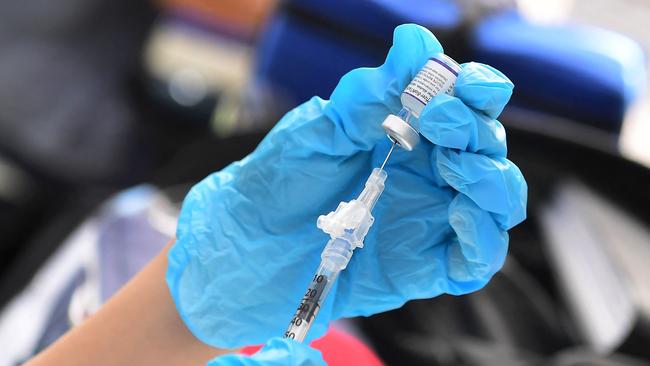
Coronavirus
Don't miss out on the headlines from Coronavirus. Followed categories will be added to My News.
Austria has become the first EU country to announce it would make coronavirus vaccinations mandatory and will next week impose a partial lockdown in the face of spiralling infections.
The lockdown, which comes into effect on Monday local time, constitutes the toughest restrictions introduced in Europe in recent weeks as Covid-19 cases surge continent-wide, fuelled by vaccine resistance.
Austrians will not be allowed to leave home except to go to work, shop for essentials and exercise. The restrictions will initially last 20 days with an evaluation after 10 days, Chancellor Alexander Schallenberg said.
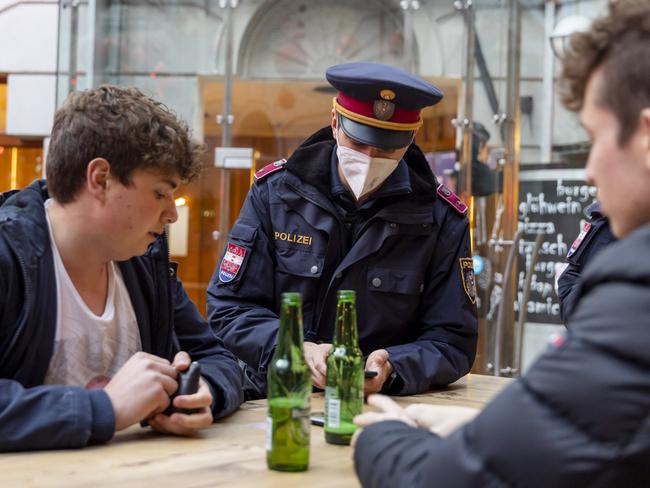
Schools will remain open, although parents have been asked to keep their children at home if possible. Working from home is also recommended.
Vaccination against Covid-19 in the Alpine nation will be mandatory from February 1 next year, Mr Schallenberg said. So far, the Vatican alone in Europe has imposed a vaccination mandate.
“Despite months of persuasion, we have not succeeded in convincing enough people to get vaccinated,” Mr Schallenberg told a press conference, calling vaccinations the only “exit ticket” out of the pandemic.
At the beginning of the week, Austria sought to impose restrictions on those not vaccinated or recently recovered from the virus, becoming the first EU country to do so.

But infections continued to rise. On Friday, a new record of more than 15,800 new cases were recorded in the EU member of nearly nine million people.
“I was hoping that there wouldn’t be a general lockdown,” said Markus Horvath as he prepared to shut from Monday his stall selling wooden jewellery at a Christmas market in Vienna.
Andreas Schneider, a 31-year-old from Belgium who works as an economist in the Austrian capital, described the lockdown as a “tragedy”, saying confining just the unvaccinated had been “reasonable” since they had a choice.
Other European countries are also re-introducing curbs to fight the virus’ spread.
On Friday, the German state of Bavaria cancelled all of its popular Christmas markets this year, as well as announced a shutdown of clubs, bars and night service at restaurants.
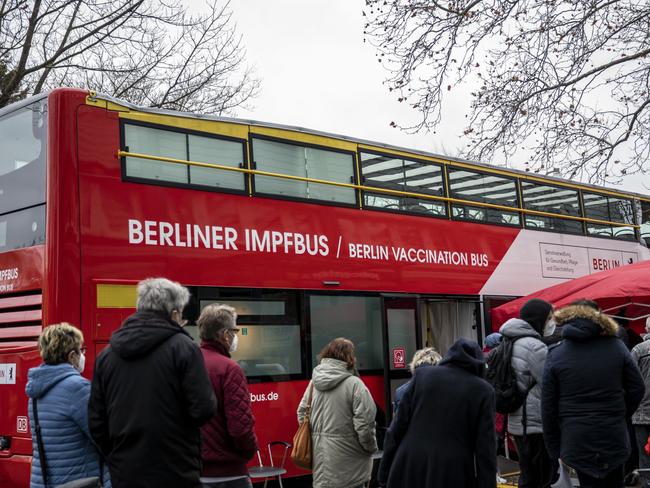
“The situation is very, very serious and difficult,” state premier Markus Soeder told a news conference.
Chancellor Angela Merkel and the leaders of Germany’s 16 states agreed Thursday to exclude the unvaccinated from restaurants, sporting events and cultural shows.
Hungary, which neighbours Austria, is making mask-wearing compulsory indoors again from Saturday.
Last Saturday, the Netherlands shut bars, restaurants, cafes and supermarkets from 8:00pm for three weeks with non-essential shops forced to shut at 6:00pm.
PROTESTS
The Dutch are limited to having four visitors at home and have been advised to work at home unless absolutely necessary with public events scrapped, although schools remain open and people can leave their homes without restrictions.
In Austria, demand for vaccinations has increased in recent days, and 66 per cent of the population are now fully jabbed, slightly below the EU average of more than 67 per cent.
Outside Europe, Indonesia, Tajikistan and Turkmenistan have made Covid-19 vaccination mandatory, while French Pacific territory of New Caledonia has also decided to impose vaccination from the end of December.
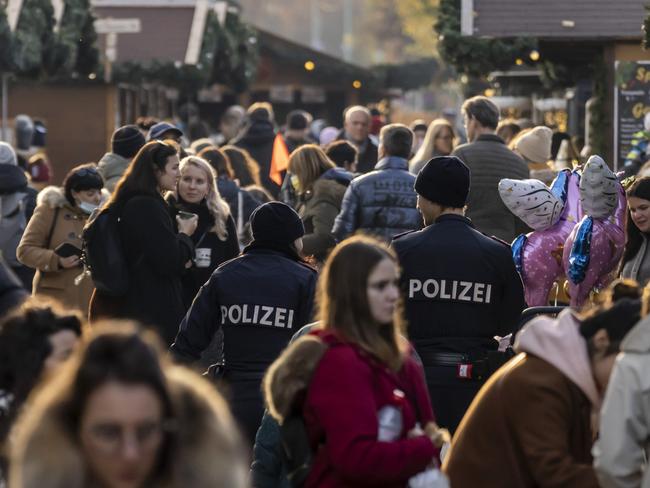
On Friday, Austrian opposition party NEOs said the government should have acted sooner to avoid intensive care units from struggling and thus prevent another lockdown -- the fourth in the country since the pandemic hit Europe last year.
“Austria is now a dictatorship!” said Herbert Kickl, the head of the far-right Freedom Party (FPOe), which was a junior partner in the country’s last government, referring to the plan to make vaccinations mandatory.
On Sunday, hundreds demonstrated against the lockdown for the unvaccinated. The FPOe is planning a bigger rally on Saturday though Kickl will miss it as he has contracted the virus.
On Monday, Vienna city authorities also became the first in the EU to start inoculating children between the ages of five and 11.
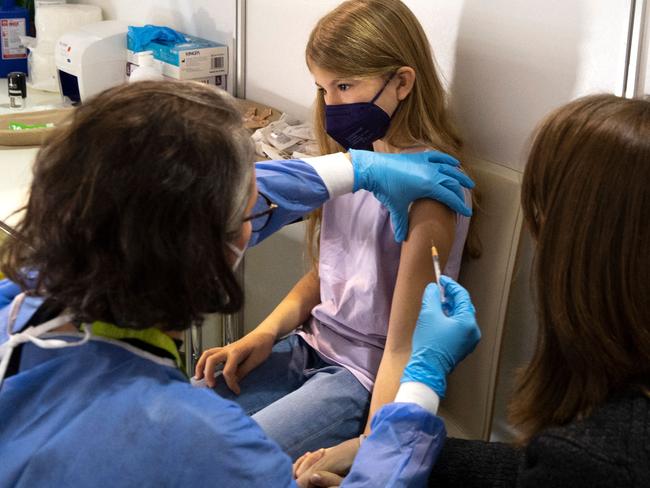
They said they would increase the offer in line with high demand even though the European Medicines Agency has not yet approved any of the coronavirus vaccines for the five-to-11 age bracket.
Canada on Friday became the latest country to authorise the Pfizer-BioNTech Covid-19 vaccine for children aged between five and 11-years-old.
EU BACKS COVID PILL FOR EMERGENCY USE
It comes as the EU’s drug watchdog backed Merck’s anti-Covid pill for emergency use ahead of its formal authorisation and started reviewing Pfizer’s antiviral treatment as cases soar across Europe.
The two pills by the US pharma giants represent a potentially groundbreaking step in the fight against coronavirus as studies show they cut the risk of hospitalisation and death in high-risk patients.

The European Medicines Agency (EMA) said that while the Merck pill was not yet approved, it had “issued advice” so that individual countries in the 27-nation EU could decide whether to use it in case of a surge in infections.
“The medicine, which is currently not authorised in the EU, can be used to treat adults with Covid-19 who do not require supplemental oxygen and who are at increased risk of developing severe Covid-19,” the EMA said in a statement.
“EMA issued this advice to support national authorities who may decide on possible early use of the medicine prior to marketing authorisation, for example in emergency use settings, in light of rising rates of infection and deaths due to Covid-19 across the EU.” The Merck pill should not be used by pregnant women or women who are not using contraception and could get pregnant, the EMA said.
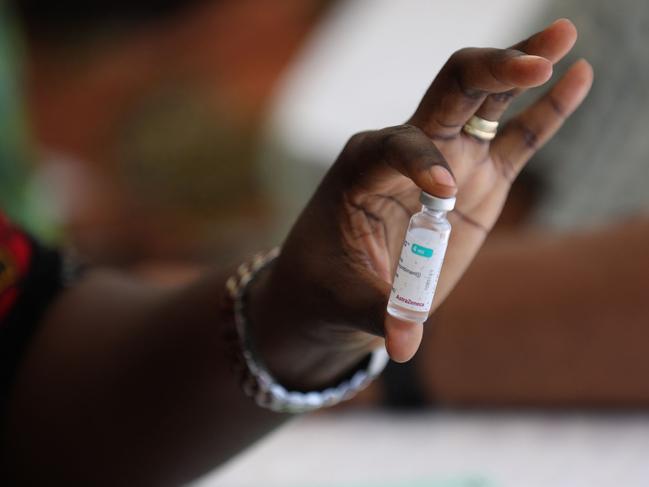
“These recommendations are given as laboratory studies in animals have shown that high doses of (the Merck pill) can impact the growth and development of the foetus,” it added.
The pill should be given as soon as possible after Covid symptoms start, at the latest within five days. It should then be taken for five days, the EMA said.
The Amsterdam-based watchdog says it hopes to decide on formal approval for the Merck pill, also known as molnupiravir, by the end of the year.
Separately the EMA said it had started a review of Pfizer’s pill so that it could give similar advice.
“EMA is reviewing currently available data on the use of Paxlovid, an oral treatment for Covid-19 developed by Pfizer,” the EMA said.
A full “rolling review” for formal approval is expected to start next week, but the EMA said it wanted to be able to help national authorities “in the shortest possible timeframe”.
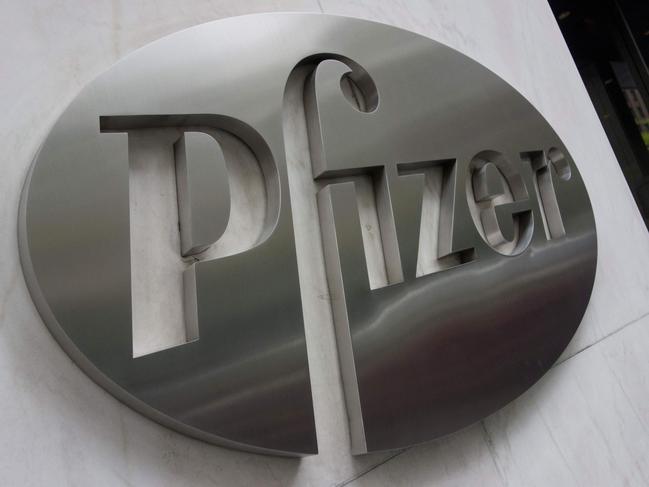
Trials show both pills are particularly effective in treating newly-infected high-risk patients when given within days of the onset of the disease.
They are both cheaper and easier to administer than other antivirals which need to be taken intravenously, and also cheaper than vaccines to make, with a simpler supply chain.
Merck’s pill decreases the ability of the coronavirus to multiply by increasing the number of mutations in its genetic material (or RNA).
The Pfizer pill uses a different method, belonging to a class of antivirals called “protease inhibitors”, which block the action of an enzyme that is critical to viral replication.
It is a combination of a new molecule, PF-07321332, and HIV antiviral ritonavir. Europe has been searching for whatever methods it can to curb a fourth wave of Covid cases that has already prompted several countries to tighten restrictions.
The EMA warned on Thursday that countries should “close the gap” on vaccinations as many of those in hospitals were unvaccinated.

US SCIENTIST SAYS HE’S FOUND REAL ‘PATIENT ZERO’
Meanwhile, the first case of Covid-19 identified in Wuhan, China and presented as such by the World Health Organisation was actually days later than previously believed and at an animal market, a top scientist said in the journal Science.
Rather than the original patient being a man who had never been to the Wuhan market where wild and domestic animals were sold, the first known case of Covid-19 turns out to have been a woman who had worked in the market, virologist Michael Worobey wrote.
For Dr Worobey, that key piece of information, and his analysis of other early cases of Covid-19 in the city, clearly tip the scales towards the virus having originated in an animal.
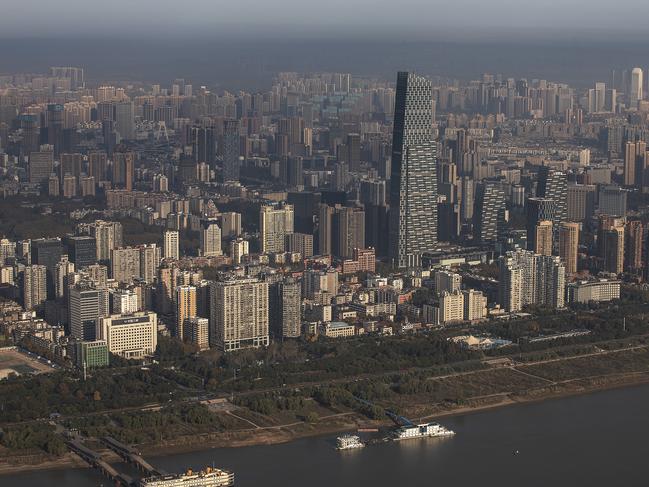
With no definitive evidence, debate has raged among experts since the start of the pandemic almost two years ago over the origin of the virus.
Dr Worobey was one of the 15 or so experts who in mid-May published a column in Science demanding serious consideration of the thesis that the virus had leaked from a laboratory in Wuhan.
In this latest article, he argued that his research into the origin of the outbreak “provides strong evidence of a live-animal market origin of the pandemic”.
One criticism of the market theory was that because health authorities raised the alert about cases of a suspicious disease linked to the market as early as December 30, 2019, that would have introduced a bias that led to the identification of more cases there than elsewhere, since attention had already been drawn to it.
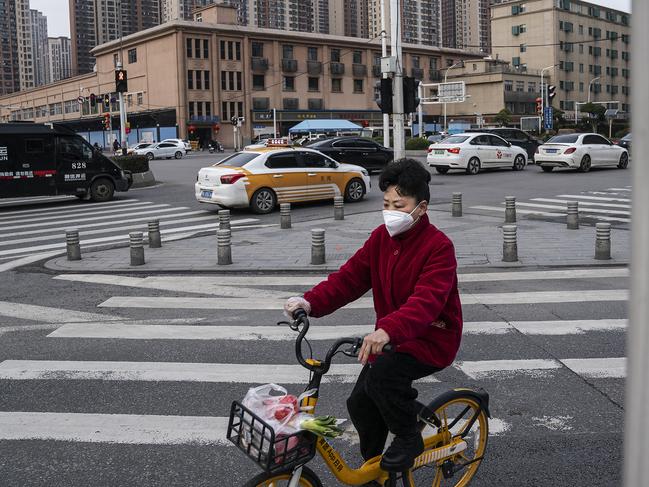
To counter that argument, Dr Worobey analysed cases reported by two hospitals before the alert was raised.
Those cases were also largely linked to the market, and those which were not were nevertheless geographically concentrated around it.
“In this city of 11 million people, half of the early cases are linked to a place that’s the size of a soccer field,” Dr Worobey told the New York Times.
“It becomes very difficult to explain that pattern if the outbreak didn’t start at the market.” Another criticism of the theory was based on the fact that the first case identified was unrelated to the market.
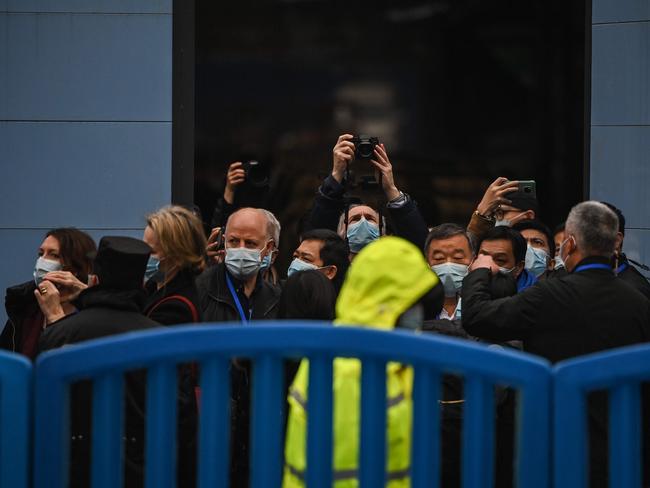
But while the WHO report claimed the man originally identified as patient zero had been ill from December 8, he actually was not sick until December 16, according to Dr Worobey.
That deduction was based on a video interview he found, from a case described in a scientific article and from a hospital medical record that matched the 41-year-old man.
That would mean the first reported case would be the woman who worked in the market, who fell ill on December 11.
Peter Daszak, a disease expert who was on the WHO investigation team, said he was convinced by Worobey’s analysis.
“That December 8 date was a mistake,” he told the Times.
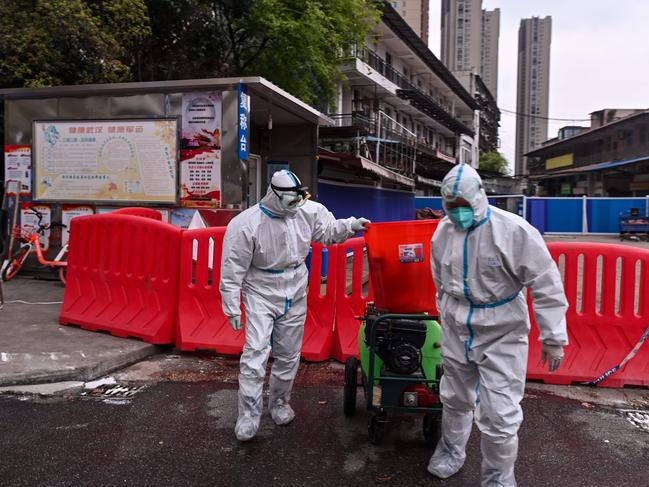
ARDERN’S HILARIOUS RESPONSE TO X-RATED QUESTION
Meanwhile, Jacinda Ardern has had a brilliant response to a comedian who has demanded New Zealand’s leaders let them know when they can once again “go out an f**k a stranger”
New Zealand comedian Chris Parker took to Instagram to demand the country’s leaders let Kiwis know when they can get back to having casual sex amid Covid guidelines.
While a vaccine ad airing across New Zealand has said “two shots” of Pfizer are suggested “to do the deed”, politicians have not addressed the matter directly.
With New Zealanders baffled by intimacy guidelines, Parker shared a hilarious video calling on journalists to ask Ms Ardern and New Zealand’s Director General of Health Dr Ashley Bloomfield when people can “go out and f*** a stranger”.
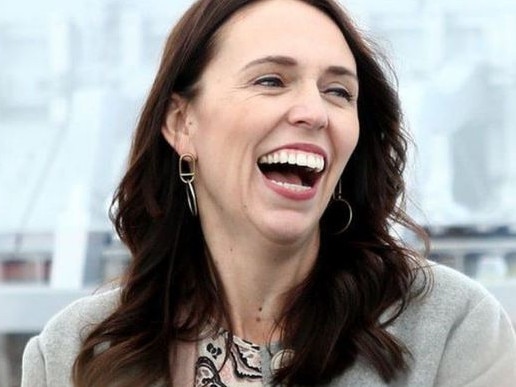
“I just have one question prime minister,” he says in the video, as he pretends to be a reporter at a press conference.
“I feel like there was just one question that was not addressed at all – and is kind of the big elephant in the room.
“When are we able to go out and have sex with strangers? Because I feel like that is something we all want to know: “When can we all go out and just f*** someone we don’t know?”
The video went viral, attracting the attention of thousands of social media users – including the New Zealand PM.
In response to Parker’s string of questions, which also included clarity on the government’s policy on “orgies”, Ms Ardern appropriately commented by posting a shocked face emoji.
The PM’s response seemed to endear her to New Zealanders.
“Best PM ever,” one person said.
“Oh this is gold!” another added.


Still, some Kiwis remained confused by the country’s official stance on sex with strangers, given Ms Ardern shed no light on the matter.
“OK, but what are the rules?” one wrote, tagging Ms Ardern.
“Is it a ‘as long as your Bluetooth is on you’re good’ kind of scenario?” another wrote.
“Come on …. tell us!” a third said.
EUROPE FACES CHRISTMAS LOCKDOWN
Europe could face another Christmas lockdown as cases have exploded across the continent.
World Health Organisation said Europe was the only region in the world where Covid-related deaths increased last week, as Belgium’s Prime Minister said the continent was on “red alert”.
Within Europe, the WHO said that the highest number of cases came from Russia, Germany, and the UK, according to a report in The Sun.
German cases are spiralling in what Chancellor Angela Merkel called a “dramatic” fourth wave.
With the country’s hospitals on the brink of collapse, a lockdown could soon come into force which would last until December 15.
Germany’s disease control agency, The Robert Koch Institute, reported 65,371 new daily cases, shattering the previous 24-hour record and continuing an upward trend that experts have warned about for weeks
“We are currently heading toward a serious emergency,” institute director Lothar Wieler said during an online debate late Wednesday.
“We are going to have a really terrible Christmas if we don’t take countermeasures now.”
But the country’s jab rate of just 68 per cent lower than the European average, though many countries have managed to drive down death rates.
German politicians approved new legislation that includes requirements for employees to prove they are vaccinated, recovered from Covid or have tested negative to access communal workplaces.
Meanwhile, in Belgium, Prime Minister Alexander De Croo announced a series of measures in a bid to avoid a winter lockdown.
“All the alarm signals are red. Europe’s map is quickly going red, and we are the same,” he said.
Children from the age of 10 and above will now have to wear masks, and working from home for at least four days a week will be made compulsory starting from Saturday.
The situation is also deteriorating in Italy and it stands on the brink of a fourth lockdown as the number of daily cases reaches the highest level since May.
The Netherlands has already introduced a partial lockdown and Austria will impose a lockdown for the two million unvaccinated people on Monday.
France is being hit by a fifth wave of Covid with more than 20,000 cases reported on Wednesday.
Speaking on 20 Minutes, the country’s health minister Olivier Véran said: “The fifth wave is now hitting France.”
NOVAVAX FILES FOR EU COVID VACCINE APPROVAL
Meanwhile, pharmaceutical giant Novavax has applied for authorisation for their coronavirus vaccine in the EU with a decision possible “within weeks”, Europe’s drugs regulator said Wednesday local time.
The jab, if approved, would be the fifth authorised for use within the EU — the other four are made by BioNTech/Pfizer, AstraZeneca, Moderna and Johnson & Johnson.
The vaccine’s assessment, which goes under the brand name Nuvaxovid, would be carried out “under an accelerated timeline”, the European Medicines Agency said.
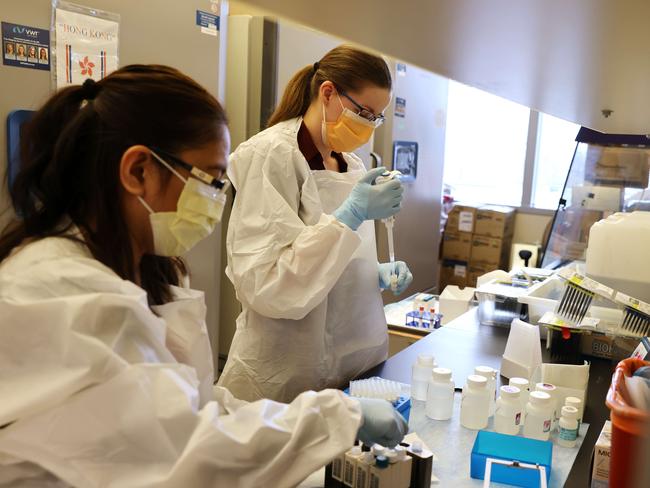
An opinion on the marketing authorisation could be issued within weeks “if the data submitted are sufficiently robust and complete to show the efficacy, safety and quality of the vaccine”, the medicines watchdog said.
“If EMA concludes that the benefits of Nuvaxovid outweigh its risks in protecting against Covid-19, it will recommend granting a conditional marketing authorisation,” it said.
SWEDEN TO INTRODUCE COVID PASS
Sweden, meanwhile, will introduce a Covid-19 vaccination pass on December 1 for public indoor events of more than 100 people, as cases rise in much of Europe, the government said Wednesday.
With infection rates relatively low, Sweden on November 1 removed the requirement for fully vaccinated people with symptoms to get tested for Covid, but the government said it was now reversing that decision after criticism.
Health Minister Lena Hallengren said Sweden expected to see a rise in cases during the winter and was “not isolated from the rest of the world”.
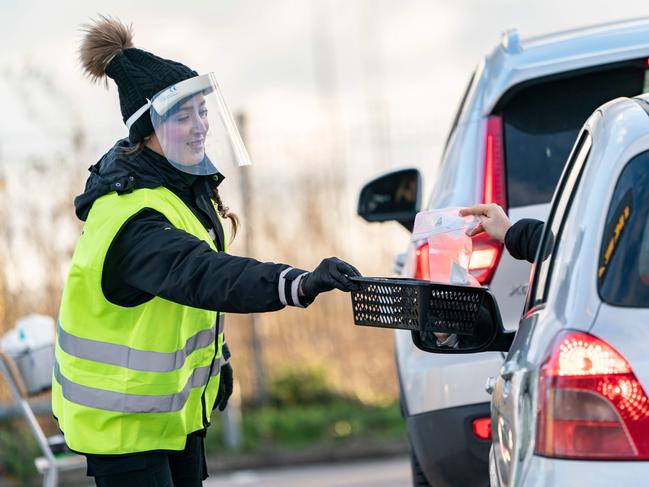
The vaccination pass will be required for those over the age of either 16 or 18 — the government has yet to decide — at events like concerts, theatres and sporting events, but not at restaurants and bars.
Organisers who do not require the pass will be subjected to other strict restrictions on crowd numbers and social distancing.
In the early phases of the pandemic, Sweden stood out by not introducing a lockdown and only recommending the use of face masks in certain situations where crowding was unavoidable.
It relied instead on non-coercive recommendations, though some restrictions were introduced including on the number of people allowed at public gatherings and restaurants, and earlier closing times for bars and restaurants.
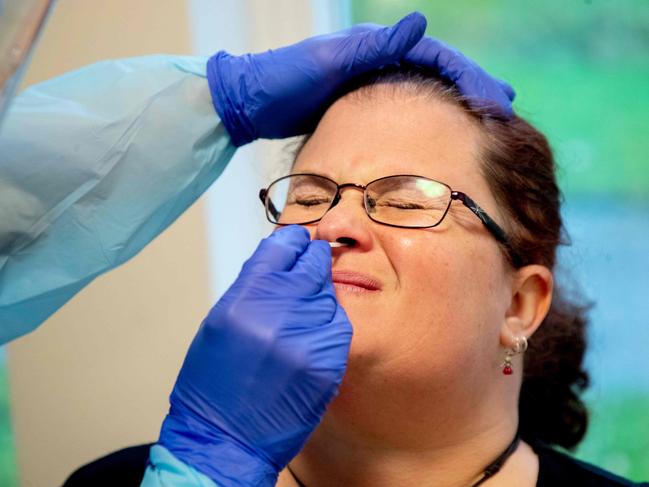
It lifted all of its restrictions in late September, as its vaccination program progressed and case numbers were under control.
A total of 67 per cent of Swedes are now fully vaccinated, rising to 82 per cent of those over the age of 16, according to the Public Health Agency.
The country currently has an incidence rate of 85.8 cases per 100,000 inhabitants over the past 14 days, according to the World Health Organisation — one of the lowest in Europe and far below that of its Nordic neighbours where cases are soaring.
PFIZER STRIKES GLOBAL DEAL ON COVID PILL
US pharmaceutical giant Pfizer on Tuesday local time announced a deal to make its prospective antiviral Covid-19 pill available more cheaply in the world’s least wealthy countries.
Pfizer will sub-licence production of its promising Paxlovid pill to generic drug manufacturers for supply in 95 low- and middle-income nations covering around 53 per cent of the world’s population.
Under the deal struck with the global Medicines Patent Pool (MPP), Pfizer — which also produces one of the most widely-used Covid vaccines with German lab BioNTech — will not receive royalties from the generic manufacturers, making the treatment cheaper.
The agreement is subject to the oral antiviral medication passing ongoing trials and regulatory approval.
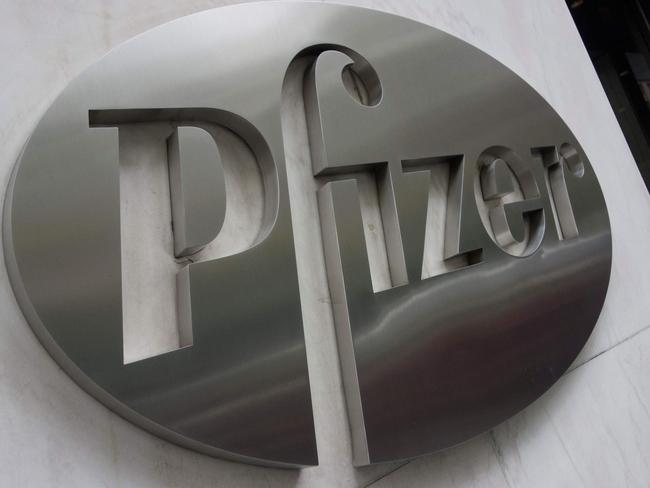
The Pfizer drug is to be taken with the HIV medicine ritonavir. Interim data from ongoing trials demonstrated an 89 per cent reduction in the risk of Covid-19-related hospitalisation or death compared to a placebo, in non-hospitalised high-risk adults with Covid-19 within three days of symptom onset, said Pfizer.
Similar results were seen within five days of symptom onset, it added. The Geneva-based MPP is a United Nations-backed international organisation that works to facilitate the development of medicines for low- and middle-income nations.
If approved, the pill could be on the market in “a matter of months”, MPP policy chief Esteban Burrone told reporters.
HIV DRUG MIX
Pfizer will forego royalties on sales in all countries covered by the agreement while Covid-19 remains classified as a Public Health Emergency of International Concern by the World Health Organisation.
Last month, the WHO maintained the highest level of alert over the spread of the SARS-CoV-2 virus that causes Covid-19.
Paxlovid, or PF-07321332, is an investigational antiviral therapy designed to block the activity of the SARS-CoV-2-3CL protease — an enzyme that the coronavirus needs to replicate.
Taking it together with a low dose of ritonavir helps slow the breakdown of PF-07321332. It therefore remains active in the body for a longer period at a high concentration, to help combat the virus.
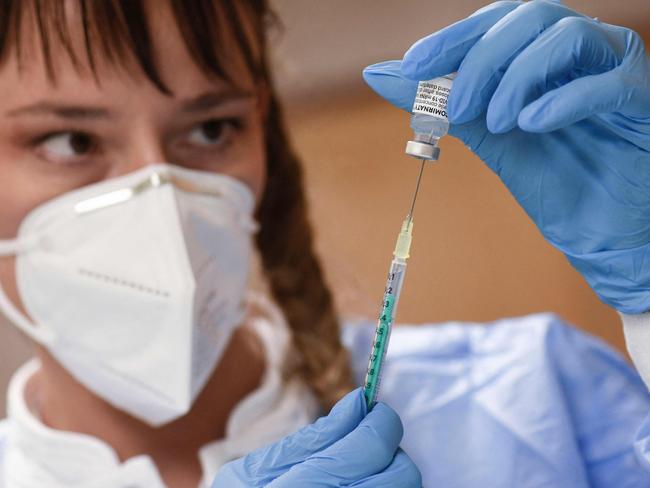
The pill could potentially help patients avoid severe illness, which can lead to hospitalisation and death, Pfizer said.
“We believe oral antiviral treatments can play a vital role in reducing the severity of Covid-19 infections, decreasing the strain on our healthcare systems and saving lives,” said Pfizer chairman and chief executive Albert Bourla.
While a multitude of vaccines have been rolled out in the pandemic, the hunt for treatments for those who have already caught the disease has not been as fruitful.
AGREEMENT FOLLOWS MERCK DEAL
The MPP was founded by Unitaid, which works on innovations to prevent, diagnose and treat major diseases in poorer countries.
“During a pandemic, saving time means saving lives. This agreement could help us to reach more people more quickly as soon as the medicine is approved,” said Unitaid executive director Philippe Duneton.
Potential sublicensees have until December 6 to register an expression of interest.
The announcement comes after the MPP signed a similar voluntary licensing deal with Pfizer’s US rivals Merck & Co last month for its investigational oral antiviral medicine molnupiravir.
Subject to regulatory approval, the deal will help create broad access to molnupiravir in 105 low- and middle-income countries.

Pills are easier to make than vaccines, do not require a cold chain for delivery and can be self-administered by the patient.
In terms of relieving health systems by preventing hospitalisations, “it’s a game changer”, said Burrone.
He said pricing for the Pfizer pill had not yet been set, but said that “in a competitive environment … the prices tend to come down” to a low level.
Doctors Without Borders (MSF) meanwhile suggested it might cost around US$700 (A$960) per Pfizer treatment course, in line with molnupiravir.
The medical charity said it was disheartened by the deal, saying restrictive voluntary licences were no substitute for guaranteed global access to Covid tools to bring the pandemic under control.
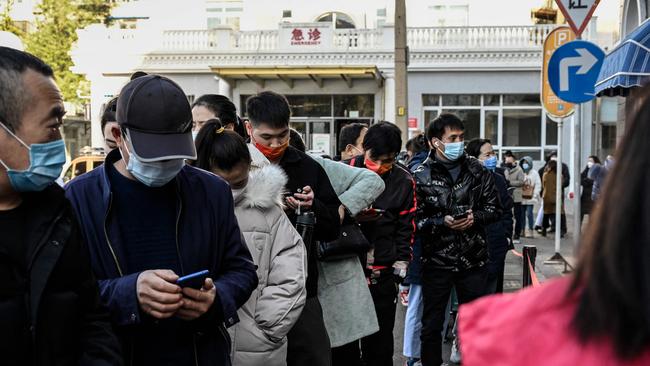
AUSTRIA FIRST EU COUNTRY TO LOCK DOWN THE UNVACCINATED
Austria on Monday local time became the first country in the European Union to impose a lockdown on the unvaccinated and start inoculating children as young as five after coronavirus cases surged across the continent.
Infection rates have zoomed, placing Western Europe once again at the heart of the global epidemic and governments are being forced to take action with the Netherlands already announcing the region’s first partial lockdown of the winter.
Austria has inoculated about 65 per cent of its nine million people, below the EU average of 67 per cent.
Daily new infection rates have been hovering at around 12,000 in recent weeks, up from roughly 2,000 a day in September.
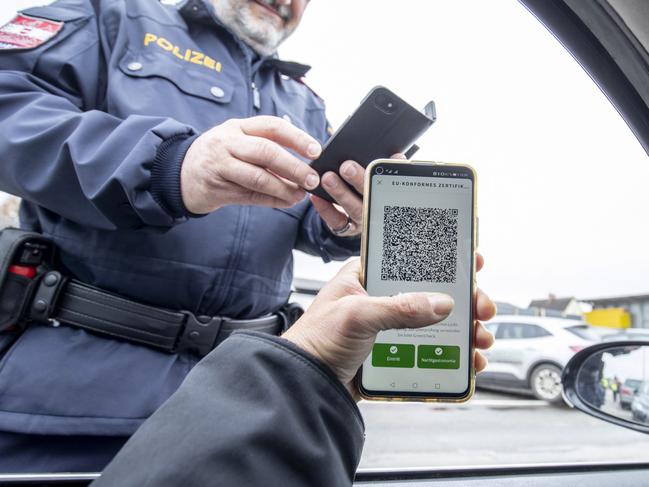
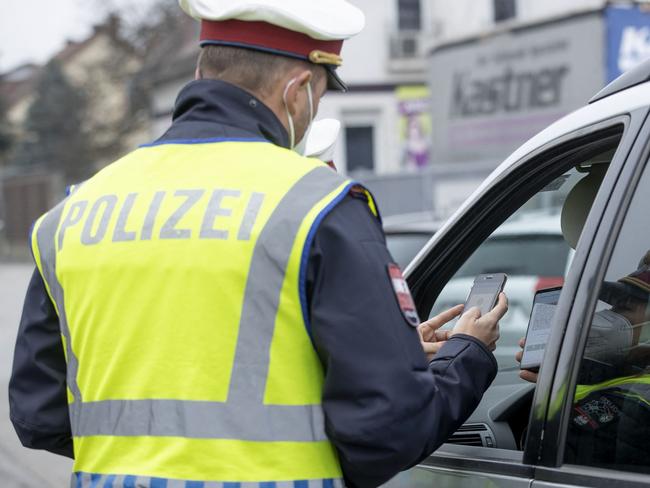
But the restrictions on the unvaccinated have fuelled accusations that Austria is cementing a “two-class system”, said Nikolaus Unterguggenberger, a teacher from Carinthia province, whose family is not vaccinated.
The 57-year-old said his two sons and one of his daughters this week had to leave their music clubs because of the lockdown rules.
“Our freedoms are being taken away from us … I was afraid it would come to this, but that Austria so easily passes this, that surprises me,” he told media adding that the measure was illegal and that he would continue to go out and meet friends.
Hundreds also gathered in Vienna on Sunday to protest.
“This restricts my life, my freedom. It’s time that more people spoke up,” Sabine, a 49-year-old energy consultant, told reporters at the rally, calling the move “discrimination”.
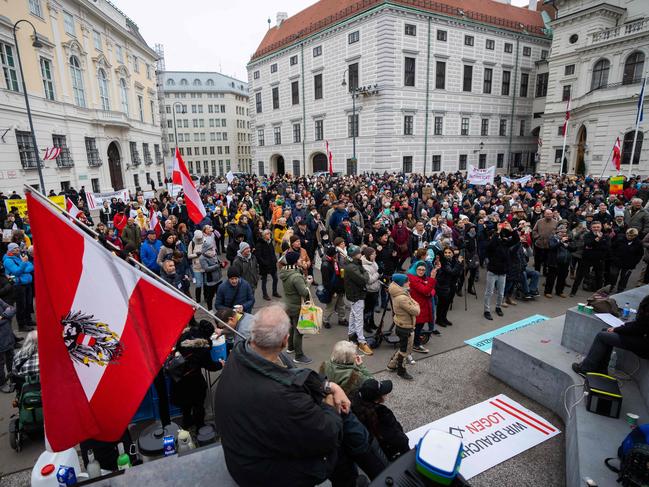
KIDS TO BE VACCINATED
As part of efforts to increase vaccination coverage, authorities in Vienna have also become the first in the EU to start jabbing children between the ages of five and 11.
Cartoons of ninja turtles and tigers adorned coronavirus vaccination booths on Monday to welcome children at a convention complex serving as a vaccine centre.
One of the first to step in was eight-year-old Pia Schwarzl. She told media the jab had hurt “a little” but that she was looking forward to “staying at home and playing” for the day.
Her father, 41-year-old Gerald Schwarzl, said he had decided to have Pia and her five-year-old brother Theo vaccinated so that they “don’t get seriously sick”.
“We believe they will be protected just like they are with other vaccinations that they’ve had,” he said.
The city authorities said some 10,000 appointments had been made for children over the weekend, and they had the capacity to vaccinate 200 youngsters a day.
The European Medicines Agency has not yet approved any of the coronavirus vaccines for the five-to-11 age bracket.
But Vienna’s Mayor Michael Ludwig said the situation was “serious” and that the city had the right to pursue a more “determined path”.
Austria hopes these measures can stem the virus and take the pressure off struggling intensive care units.
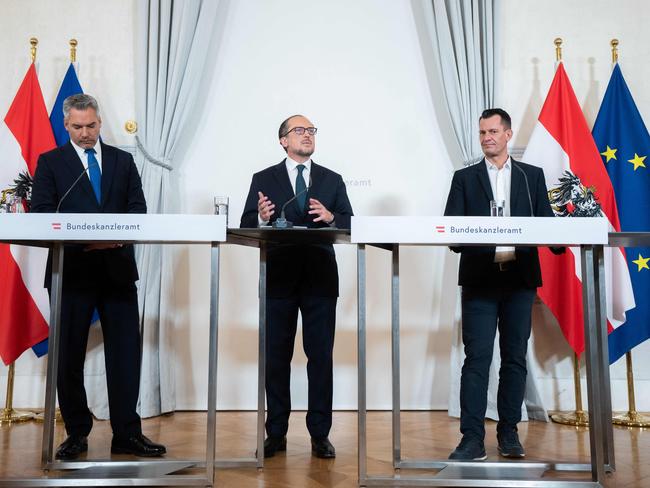
It also wants to drive up what it calls the “shamefully low” rate of fully vaccinated residents.
The interior ministry has promised extra patrols to implement the lockdown, widely criticised as unenforceable and unlikely on its own to reduce contacts.
Debates are already being aired between ministers about possible further measures, such as a night curfew for all.
At one of Vienna’s famous Christmas markets, stallholders were hoping the new measures would prevent a repeat of last year when the markets were closed to combat the second wave.
Daniel Stocker, the manager of the market in front of the capital’s City Hall, said people were “willingly” complying with the requirement to have either been vaccinated or recovered from the virus.
“We want everyone to feel safe,” he says.
BRITS ADVISED TO GET BOOSTER SHOT
Meanwhile, British Prime Minister Boris Johnson has urged Britons to get their coronavirus boosters as soon as they are eligible.
It comes as britain announced on Monday local time that Covid vaccines would be rolled out to the over 40s in order to best a northern winter wave of the virus, reports The Sun.
Teenagers between the ages of 16 and 17 will now also be able to come forward for their second coronavirus vaccine.
“If we want to control the epidemic in the UK then we must all get vaccinated as soon as we are eligible,” Mr Johnson said in an address to the nation.
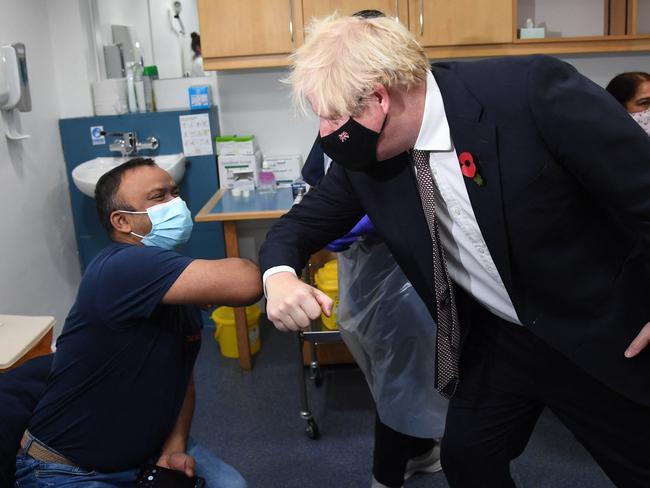
“We are making second jabs available for 16-17 year-olds and boosters available to all those 40-49, six months after their first dose.
“Over time, the protection from two jabs starts to wane, but the third jab boosts protection up to 90 per cent.
“Many more people who are eligible have not yet come forward, if you are one of those people please go and get that third jab.
“It would be a tragedy if people who have done the right thing and got double vaccinated got seriously ill or lost their lives by not getting their booster.”
Booster shots are advised six months after your second dose.
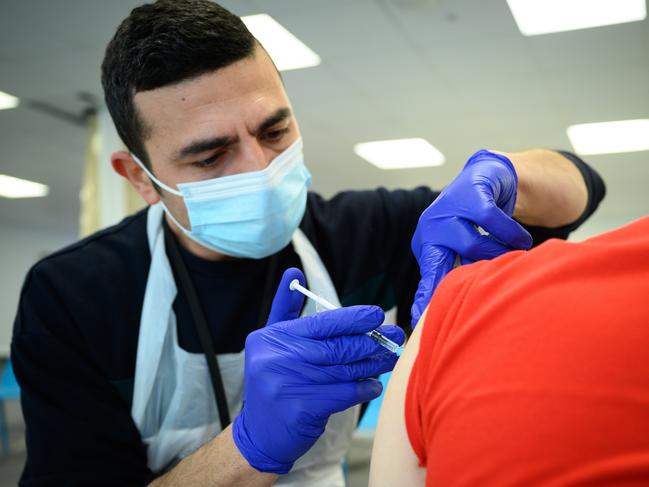
The announcement on boosters comes as results from a real world study found that Pfizer/BioNTech booster jabs give over 90 per cent protection against symptomatic Covid in the over 50s.
The findings revealed that two weeks after receiving a booster dose, protection against symptomatic infection in adults aged 50 years and over was 93.1 per cent in those with AstraZeneca as their primary course and 94.0 per cent for those who had Pfizer-BioNTech.
It’s these results that pushed the Joint Committee on Vaccination and Immunisation (JCVI) to today announce that booster jabs will be given to all those over the age of 40.
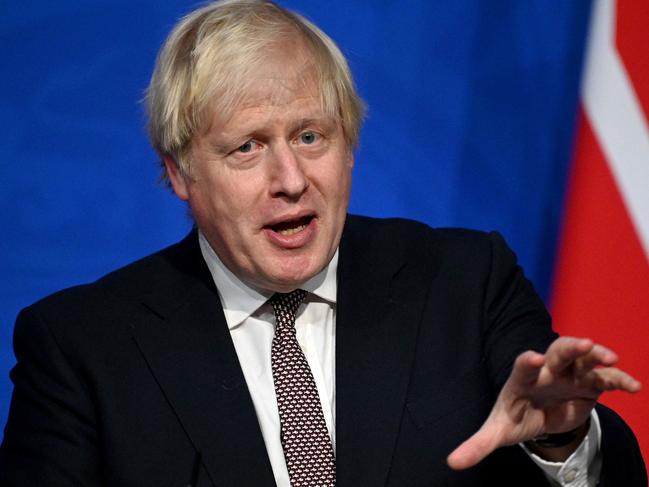
‘INFECTIONS BLIZZARD’
However, Mr Johnson has warned of an “infections blizzard” that could come over from Europe.
Face masks, work from home orders and Covid passports could come back if the Government’s so-called Plan B measures are enforced this winter.
Speaking this afternoon during a Downing Street press conference he added: “A new Covid wave has swept through central Europe and is now affecting western Europe
“If we want to avoid restrictions on our daily lives we must all get vaccinated
“please, please, go get vaccinated to protect yourself and others. And in doing so we can ensure we can continue going as we are”.
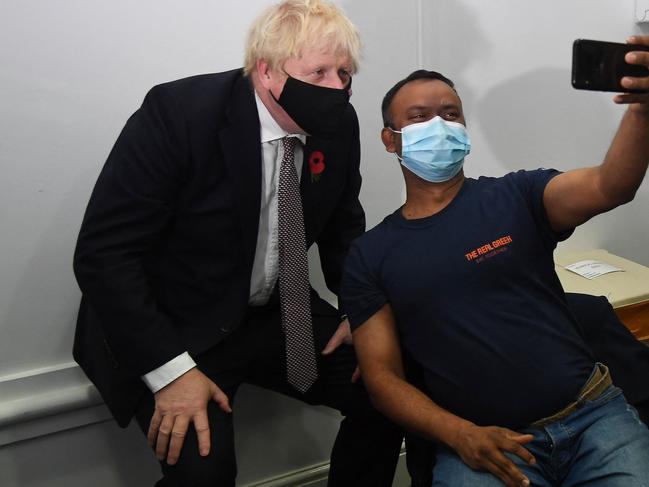
Speaking to broadcasters on a visit to a medical centre in East London, Mr Johnson said: “We don’t see anything in the data at the moment to suggest that we need to go to Plan B, we’re sticking with Plan A.
“But what we certainly have got to recognise is there is a storm of infection out there in parts of Europe, you can see those numbers ticking up very sharply in some of our continental friends.
“And we’ve just got to recognise that there is always a risk that a blizzard could come from the east again, as the months get colder.
“The best protection for our country is for everybody to go forward and get that booster.”
US JUDGE SLAMS BIDEN’S VACCINE MANDATE
A US judge appointed by Donald Trump has declined to lift a stay on US President Joe Biden’s Covid-19 vaccine requirement for businesses with 100 or more workers.
Under the requirement by America’s federal Occupational Safety and Health Administration, workers must be vaccinated by 4 January or use masks while on the job and undergo weekly coronavirus tests.
The attempted federal mandate is more lenient than many of the measures implemented by some private businesses and state or local governments around the US.
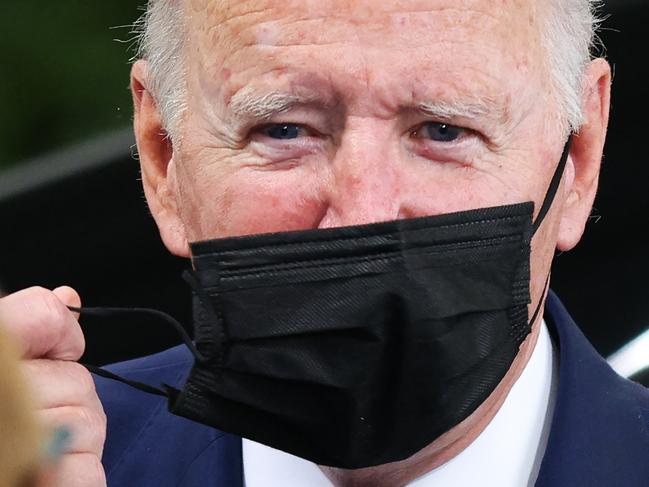
The Biden administration had said it was confident the national policy would be legal.
However, the fifth US circuit court of appeals, based in New Orleans and one of the most conservative federal panels, granted an emergency stay.
US justice and labour department lawyers filed a response in which they said stopping the requirement would prolong the Covid-19 pandemic and “cost dozens or even hundreds of lives per day”.
But on Friday, local time, a three-judge panel rejected that argument.
Judge Kurt D. Engelhardt wrote that the stay was “firmly in the public interest.”
The US is the worst affected country in the world by coronavirus with almost 47 million infections.
More than 762,000 people have died from Covid-19.
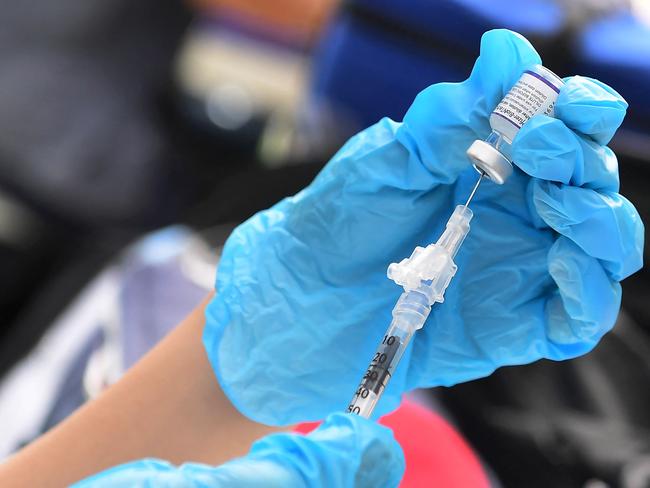
Despite those alarmingly high figures, the nation is politically divided over vaccine mandates, mask wearing rules and social distancing requirements.
Public, government sanctioned health measures have become the focus of criticism from Republican leaders and constituents despite scientific research weighing on the side of restrictions to tamp down the spread of the virus.
More than 434 million doses of vaccines have been administered across the US, and more an estimated 58.5 per cent of the population are fully vaccinated.
But there is still resistance to vaccine mandates even in public-facing and health care professions.
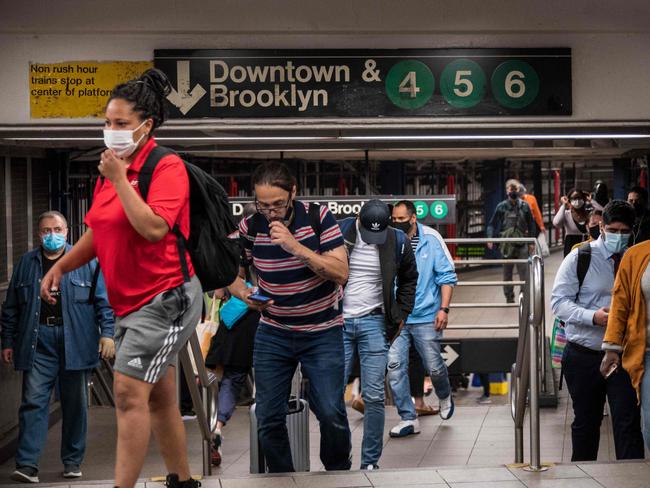
In his ruling, Judge Engelhardt cited Mr Biden’s workplace vaccine “Mandate” as the cause of “workplace strife” and “untold economic upheaval”.
Such a law, he said, is “a one-size fits-all sledgehammer that makes hardly any attempt to account for differences in workplaces (and workers) that have more than a little bearing on workers’ varying degrees of susceptibility to the supposedly ‘grave danger’ the Mandate purports to address.”
But experts say the ruling is anti-science and perilous with America heading into winter and infections rising from a plateau to another spike of around 10 per cent.
Judge Engelhardt was nominated by Donald Trump and confirmed in 2018, as was Stephen Kyle Duncan, who supported Engelhardt’s opinion.
Almost 30 US states have filed challenges to the Biden administration’s vaccine rule in federal appeals courts.
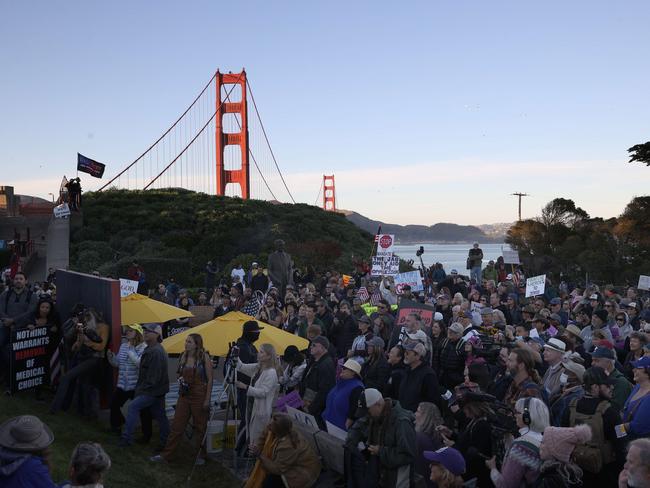
It comes as some Americans, even in less conservative states such as California, demonstrated against the vaccine mandates.
Protesters gathered during an anti-vaccination rally at the Golden Gate Bridge in San Francisco, to take a stand against Covid-19 vaccine mandates.
GERMANY CALLS IN ARMY TO COPE WITH VIRUS SPIKE
Germany is preparing to bring in the army to assist overwhelmed healthcare services, according to reports in the German media.
Der Spiegel reported that 12,000 soldiers will be mobilised between now and Christmas as cases continue to rise.
They will be tasked with providing booster vaccinations and tests in elder care homes and hospitals.
It comes as German Chancellor Angela Merkel called on unvaccinated Germans to get their jabs as quickly as possible as the nation’s Covid-19 infection rate hit new highs.
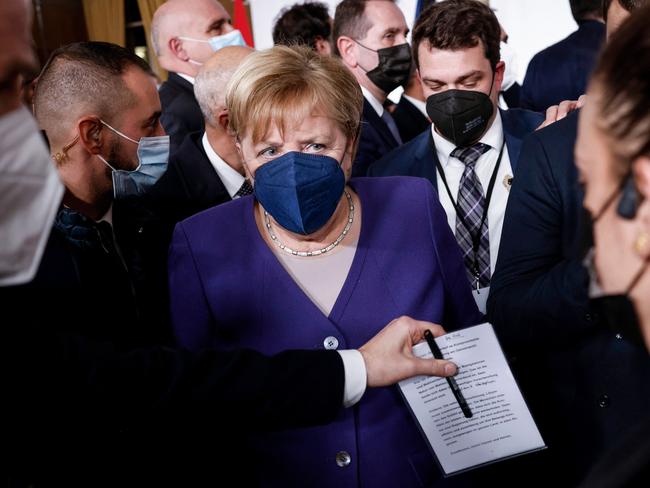
In her weekly podcast Ms Merkel said there were “very difficult weeks ahead of us”.
“Think about it again,” Merkel said to the unvaccinated. “We just need to grab it, grab it fast.
“I am asking you: join us, and try to convince relatives and friends as well,” she said.
The chancellor also reminded the vaccinated to get their booster shots.
Official figures show the country’s infection rate is steadily climbing.
The Robert Koch Institute reported 45,081 new infections, two days after the daily total topped 50,000 for the first time, and the country’s total death approach 100,000.
Germany has struggled to get more than two-thirds of the population fully vaccinated.
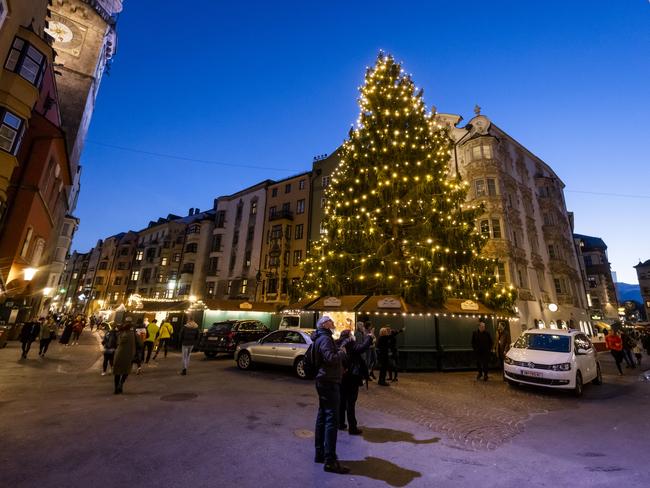
In Austria, "2G", is the term in German for people who are either vaccinated against (geimpft) or recovered from (genesen) the coronavirus.
Since 8 November, people who are unvaccinated against coronavirus are barred from entering restaurants, bars, hotel, gyms, hairdressers, ski lifts and other public places nationwide as countries in central Europe are racing to rein in skyrocketing numbers of Covid-19 infections. Approximately 90 per cent of infected people being admitted to hospital currently are unvaccinated.
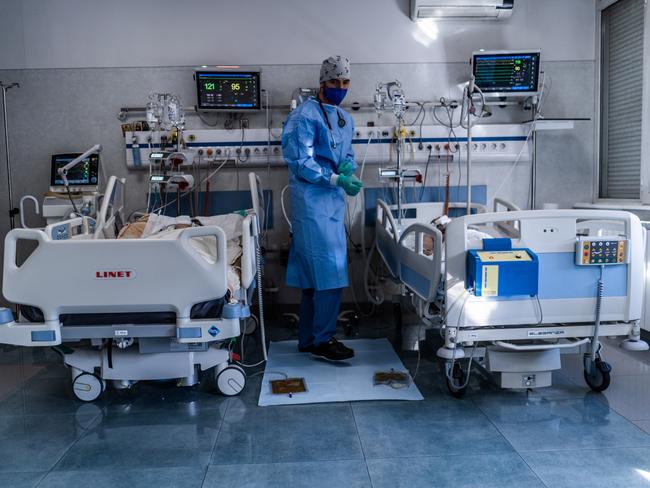
Bulgaria has reported its highest daily Covid-19 deaths, with the seven-day rolling average of deaths per million inhabitants reaching 22.8, compared with an EU average of 3.1.
And in Serbia, according to AP, the capital’s graveyard operates an extra day during the week to cope with the rising number of burials.
For around two months, a stubborn wave of Covid-19 infections have torn through numerous countries in Central and Eastern Europe where vaccination rates are lower than on other areas of the continent.
Meanwhile in Switzerland, thousands of protesters in Geneva called on fellow Swiss citizens to vote “no” in a November 28 referendum on a new law that could introduce Covid passes into Swiss life.
An opinion poll earlier this month however predicted a win in favour of the bill.
FIRST TOURISTS RETURN TO VIETNAM
The first international tourists touched down in Vietnam almost 20 months after the Southeast Asian nation closed its borders to contain coronavirus.
Two charter flights brought more than 400 South Korean and Japanese fully vaccinated passengers from Seoul and Tokyo on Thursday to the southern resort city of Nha Trang, state media reported.
The area is popular with golfers, beach lovers and scuba divers, and boasts luxury hotels.
The flights came ahead of Vietnam’s plans to reopen the resort island of Phu Quoc to vaccinated foreign visitors on 20 November, with hopes to welcome at least 5000 travellers in coming months.
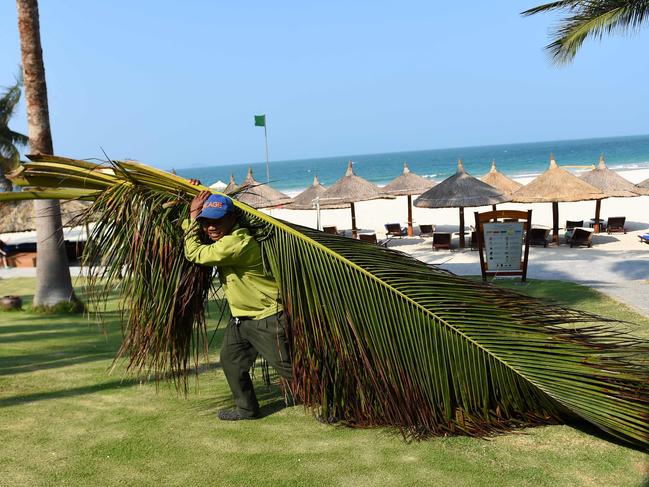
Foreign tourists seeking to enter Vietnam must show Covid-19 vaccination certificates and negative pre-departure coronavirus test results.
The communist country is desperate to revive its badly hit economy after months of lockdowns.
Its borders have been shut to international visitors since March last year and there are almost no commercial flights entering the country.
Vietnam was widely praised for its handling of the pandemic last year, with only dozens of known coronavirus cases.
But from April, the highly transmissible Delta variant took hold. Vietnam has since clocked more than a million infections and almost 23,000 deaths, as it scrambles to secure enough vaccines for its 100 million population.
So far, around 32 per cent of people have been fully vaccinated.
More Coverage
Originally published as Coronavirus world: Austria announces vaccine mandate, enters new lockdown




